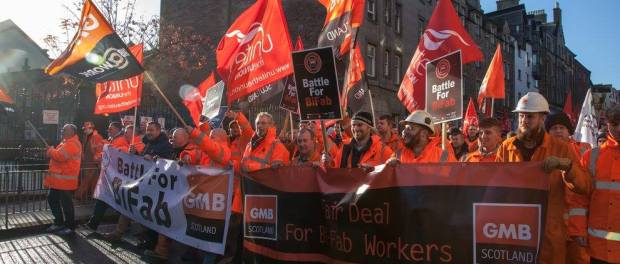BiFab battle shows why we need public ownership
 GREEN JOBS: BiFab spotlights the contradictions at the heart of attempts to fashion a market-led campaign to halt climate change. (Photo: Craig Maclean)
GREEN JOBS: BiFab spotlights the contradictions at the heart of attempts to fashion a market-led campaign to halt climate change. (Photo: Craig Maclean)
by Ken Ferguson • The successful outcome of the battle to protect the green jobs and skills at the BiFab engineering yards is a rare and highly welcome victory for workers and their unions.
It is timely reminder to workers battling low or falling pay and lousy working conditions of the potential power of united action to protect jobs and living standards. It signals the truth of the old adage, “If you stop running they’ll stop chasing you.”
Workers action can win. However welcome as the victory is in this jobs fight, problems remain.
The current deal runs until the contract completes next April; then the entire future of the skilled workforce will once again be put in the hands of a capitalist market facing cut-throat competition to keep in business.
Yet politicians of all hues continually tell us that the moves to a post-carbon economy are vital to halt climate change and that jobs such as those at BiFab are vital to such a change.
There is no doubt in the view of the Voice that climate change is a reality, and if it is not dealt with, the outcome of rising sea levels and so forth will confront humanity with colossal problems.
Indeed, the issue of climate change is recognised as a battle that must be won but unlike the usual wars of conquest and plunder, this one has the prospect of benefitting the vast majority of humanity.
Perhaps that is the reason that the dwindling band of climate change deniers is led by the odious US President Trump, backed by a clutch of vested interests in big oil, coal, and other major league polluters.
The US politics of the denier lobby is reflected here with such figures as former Thatcher acolyte Nigel Lawson and swathes of the current Tory right joining in the denier chorus.
It couldn’t be clearer: the struggle to halt climate change is, at its heart, a class issue between those who plunder the planet for profit and the vast majority who will take the hit of the damage they do.
Trade unions campaigning on the issue in their report One Million Climate Jobs, published by the Campaign Against Climate Change Trade Union group—a group including the FBU, CWS and PCS—rubbishes the idea that responsible environmentalism means spiralling unemployment, crashing economies and gloomy hand-wringing unto eternity.
Instead it insists: “Dangerous climate change is a consequence of the work of the hands and brains of many men and women. It will take the hands and brains of many men and women to undo the damage.”
The report goes on to suggest that serious moves to a post-carbon economy could create some 1.5 million jobs in making the equipment, developing alternative technologies and installing wind turbines, insulation and other necessary changes.
But it is here that the BiFab example spotlights the contradictions at the heart of attempts to fashion a market-led campaign to halt climate change.
Given the grave crisis that climate change poses, the truth is that creating and maintaining the skills base, infrastructure and research is too vital a task to be left to market forces.
This is borne out by the numerous failures of the supposedly customer-friendly market led railways, energy rip off firms, PFI profiteering in schools, hospitals and spiralling housing crisis—the list is a long one.
Imagine that we were facing an invasion from a hostile army—what would happen? The full resources of the state would be harnessed to defeat the threat. It wouldn’t be done through private contractors and deals but, as in a war, making the resources needed on a planned basis.
This is the crucial divide between those who believe that climate change can be tackled within today’s private profit-driven market system and those—mainly on the left—who think a new approach is necessary.
For socialists, the case is clear that a decarbonised economy, based on planning and public ownership, is the only serious option that can deliver skilled, well-paid and secure jobs which are not dependent on the whims of the market.
It is also the key to halting climate change. Those 1.5 million jobs could rebuild Scotland’s industrial economy and provide an entirely different future to the so-called “gig economy’ which ushers in a form of modern serfdom.
Indeed, the example of climate change is a beacon for ending market-led policies which largely exist to feed profit-hungry bosses in fields such as railways, post, housing and our vital energy supply industry.
A successful campaign to achieve the public ownership of such key sectors would also help rebuild union power and put the entire basis of the insecure, zero hours casualised economy in question.
Such an approach not only meets the needs of millions at the expense of a profit-hungry few, it opens the way to a Scotland based on the needs of people and planet before fat cat profits.

Leave a comment